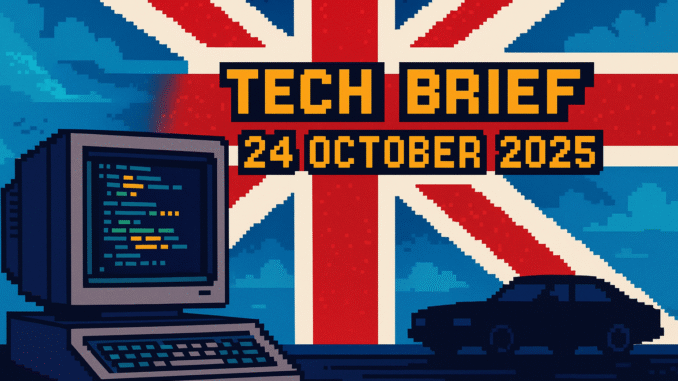
Tech Brief 24 October 2025 opens with a blunt truth: old fears have found new code. Jaguar Land Rover, once an industrial icon, now faces cyber fallout. The government is chasing AI independence, and digital literacy is suddenly urgent. No grand themes tie these together; just the shared pulse of change.
Missed yesterday’s Tech Brief? Catch up here before diving in.
Jaguar Land Rover Cyberattack to Cost UK £1.9bn, Say Cyber Monitors
Cold fact: The cyberattack on Jaguar Land Rover could cost the UK economy £1.9 billion. This isn’t a theoretical crisis. Jaguar Land Rover, brands sewn into British identity, have been hit hard. The UK Cyber Monitoring Centre’s findings are unsettling, highlighting how intertwined our critical industries are with networks that few can see and even fewer fully understand. Every breach threatens not just immediate business, but the ecosystem surrounding it: suppliers, workers, even local repair shops.
Long before ransomware was coined, “keeping spares in the boot” did the trick. Now it’s IT emergency kits, not alternators, that get British companies back on the road. Cyberattacks like this underline the need for digital vigilance. The tools have changed, but that old urge for DIY resilience remains a stubborn British trait. Are we ready for the next big one, or simply patching holes until the system coughs again?
Ministry of Justice’s Deal with OpenAI Sparks Concerns and Hopes about Sovereign AI
“Is our data staying put, or just passing through?” That question lingers after news the Ministry of Justice and OpenAI have reached an agreement to handle British user data within the UK. The deal is pitched as a move toward “digital sovereignty”; the government wants more control and oversight over sensitive information. For Gen-Xers, the memories of UK computing independence are real, with bright blue BBC Micros and the thrill of home-grown tech.
Where things feel different now: the speed and scale. Government AI infrastructure has never mattered more, particularly as large language models increasingly power everything from legal checklists to court scheduling. If you thought data localisation sounded dull, it’s worth remembering that most breaches aren’t dramatic, and sovereignty battles often unfold in server racks. Whether this marks true progress or repeating history is still up for debate around the pub table.
GCHQ Head Urges Paper Backups amid Growing Cyber Threats
Anne Keast-Butler, boss at GCHQ, thinks it’s time to get the printer out again. This week she urged British companies to bolster cyber defences not just with better software, but with physical backup plans, yes, genuine paper copies. It’s a frank recognition that even the most advanced system can fail, especially as AI-fuelled attacks become harder to spot and stop.
Oddly comforting, really. For those who quietly kept phone numbers taped inside desk drawers, it feels like a vindication rather than an embarrassment. The fact that contingency plans are swinging back to “print it out” suggests the circle of tech life is spinning faster than ever. And in the shadow of the Jaguar Land Rover story above, it’s clear that digital security isn’t just about slick encryption. Sometimes it is about holding a stack of paper when the lights go out.
UK AI Literacy Crisis: 27% Know Little about Tech They Use
New research shows over a quarter of the UK admits knowing very little about the AI in their apps and routines. Frustrating for a nation that helped pioneer digital culture, but maybe not wholly surprising. Tools become invisible fast, and algorithmic opacity is the opposite of hands-on learning.
This isn’t about nostalgia for BASIC or BBC BASIC; it’s about the real concern that even among early tech adopters, complexity is now a barrier. The survey implies we could lose the confidence to fix, tinker, or even understand what’s under the bonnet, a callback to the Jaguar Land Rover story where complexity meets crisis. Could the best move be reviving digital skills clubs, even if nobody brings a Sinclair ZX81? It is worth a thought.
From the Wayback Machine
On This Day: 1922 – Werner Buchholz, inventor of the “byte,” was born. Working at IBM in Poughkeepsie, he devised the term to describe a logical unit of memory for the Stretch supercomputer project. Rather than “bite,” he chose “byte,” cementing a standard that later defined how we store, transmit, and code information. Before the byte, character encoding was chaotic; machines used anywhere from six to eight bits per unit. Stretch’s innovations, including variable field length and error correction, set groundwork for all modern memory architecture. Today, the byte stands behind every saved file, buffer, and program. That small word lived on in machines embraced by British enthusiasts, from BBC Micro to Amiga, and in every storage device since. It’s a legacy measured in millions of gigabytes.
What This Means
Tech Brief 24 October 2025 is a reminder, not a warning, about the importance of digital self-reliance. From historic bytes to paper backup routines, today’s stories show that complexity and vulnerability still need trusty human oversight, whether in the cloud or a battered old filing cabinet.
If bytes, backups, and blue-sky data sovereignty have you reaching for the old user manuals, you’re in good company. Keep listening, tinkering, and never bin that spiral notebook.
Missed yesterday’s Tech Brief? Catch up here

Leave a Reply